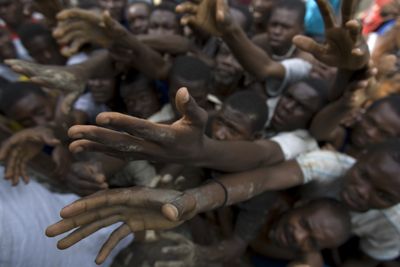Distribution woes mar aid for Haiti
Storms make fragile infrastructure worse

GONAIVES, Haiti – Food and fresh water ran dangerously low for thousands in the flood-stricken Haitian city of Gonaives and surrounding villages on Wednesday, as governments and aid groups struggled to get aid to people stranded at shelters.
Shipments of food and pledges of more poured in from around the world, but the distribution of the emergency supplies was hampered by the impoverished country’s chronic insecurity and the poor and often nonexistent network of roads and other infrastructure.
“The availability of food is not an issue,” said Myrta Kaulard, a representative of the U.N. World Food Program. “Access, yes, is an issue.”
U.N. peacekeepers have been handing out water and high-protein biscuits throughout Gonaives, which is still largely underwater after successive hits from one tropical storm and three hurricanes. But they have had to switch to distributing only at night to avoid causing a riot among desperate citizens.
A U.S. Navy ship, the USS Kearsarge, arrived off the coast Sunday evening with amphibious boats and helicopters capable of resolving some of the logistical problems. But Hurricane Ike delayed the vessel’s arrival to the capital, Port-au-Prince, until late the next day, and its helicopters spent two days trying to find a safe spot to land in Gonaives.
Amphibious boats and helicopters from the Kearsarge have since delivered more than 85 metric tons of rice, beans and flour to the city. But the rice cannot be sent to shelters until the U.N. World Food Program sends in culinary kits to cook it, said Vicky Delore Ndjeuga, a U.N. spokesman for the mission in Gonaives.
The slow pace of the aid was evident in Gonaives. At least 331 people have been killed in several storms, and the toll could rise. Nine people have already died in shelters with little supplies or organization.
Floodwaters from Hurricane Ike receded to ankle-level in many parts of the city, allowing more hungry and injured people to make their way to a hospital run by Doctors Without Borders.
There, a team of doctors from around Latin America scrambled to treat about 200 people with infections on their feet and legs from more than a week of slogging through flooded streets.